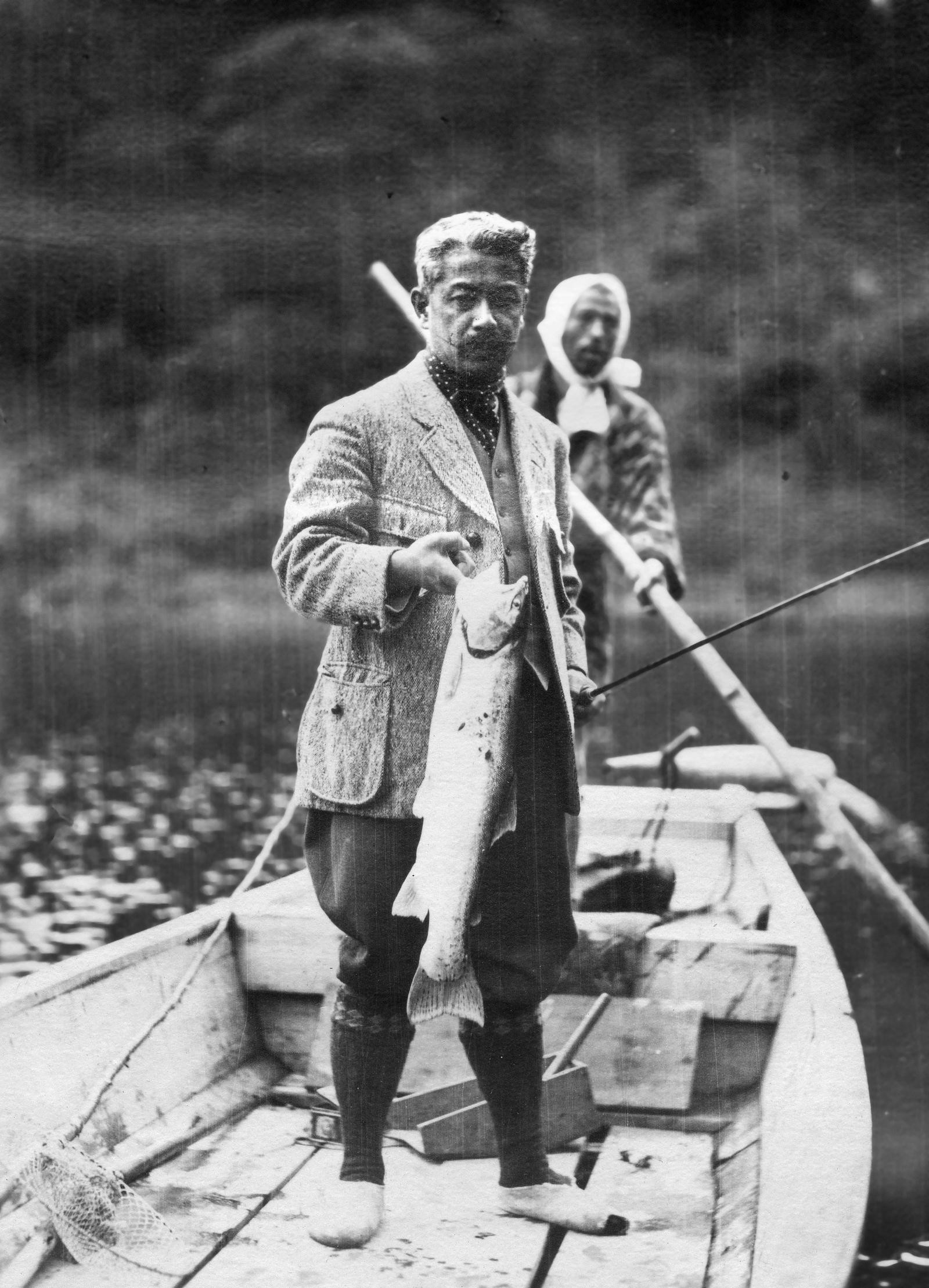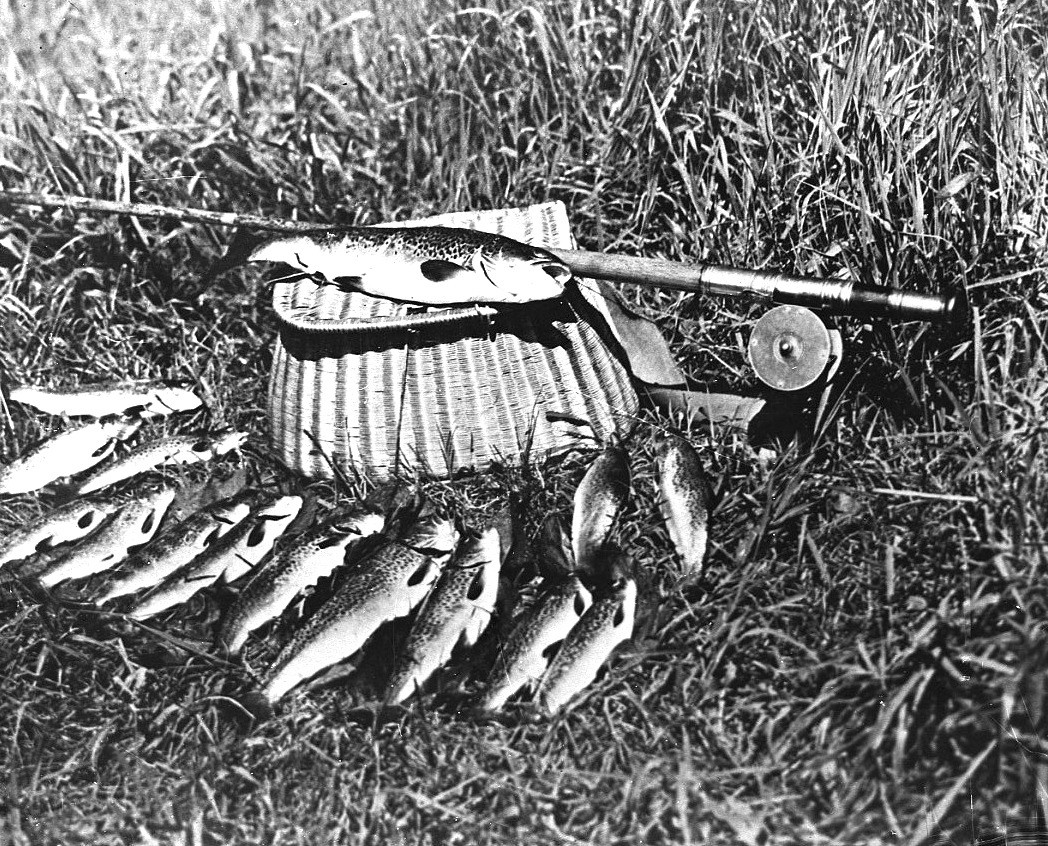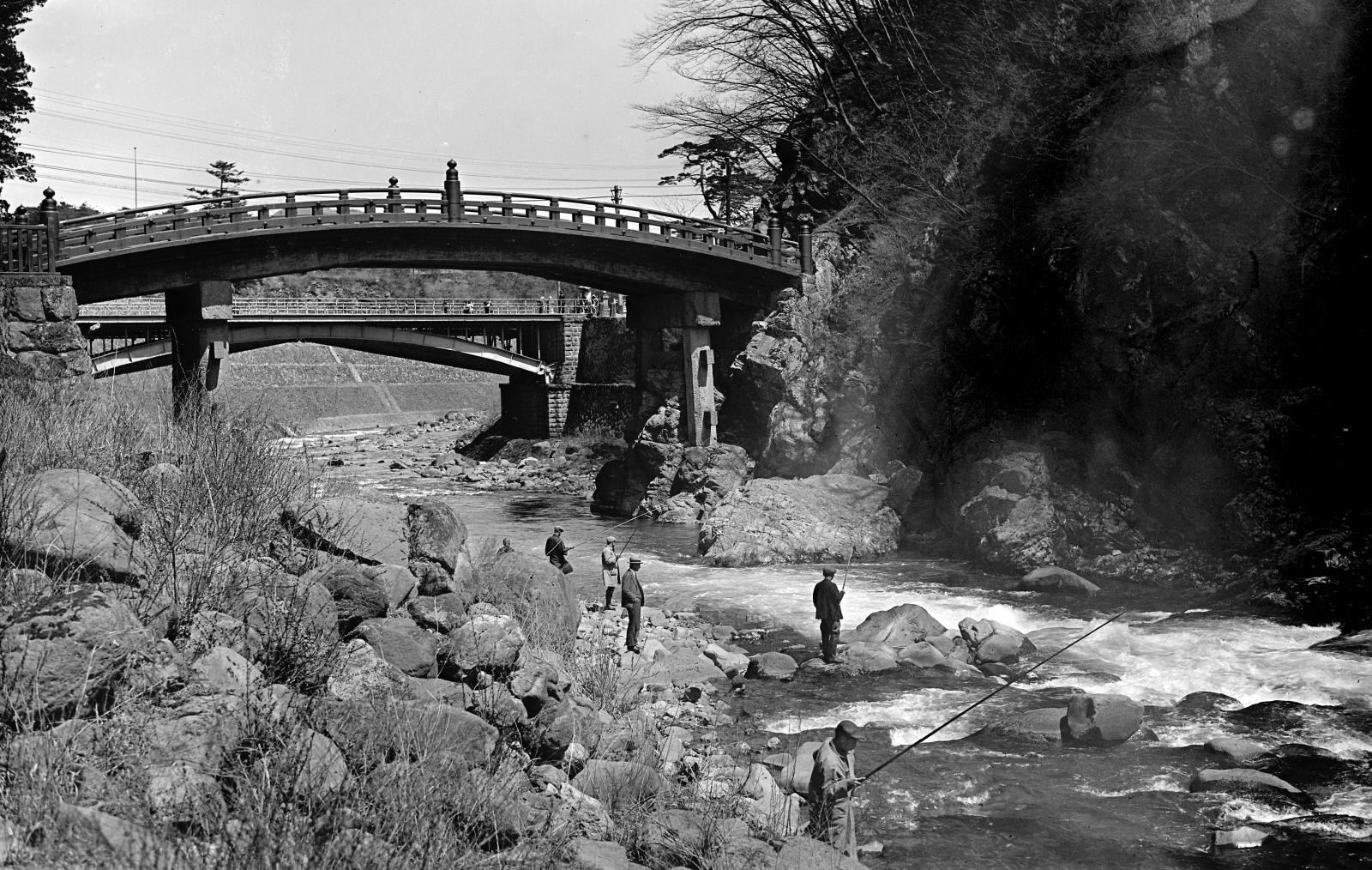71:眞一と釣り - The Second-Generation Owner, Shinichi Kanaya, and His Love for Fishing -
二代目社長金谷眞一は、釣りを趣味としていました。
当ホテルには、その頃の写真が多く残されています。
Shinichi Kanaya, the second-generation owner of our hotel, was an avid fisherman, with a particular fondness for fly-fishing. Numerous photos from that era, showing him enjoying his hobby, are still preserved at the hotel.
奥日光は、日本におけるフライフィッシングの発祥の地とされます。
眞一も正造と一緒に湯川などへ出掛けていたようですが、最初の釣りでのヒットの瞬間がその後の熱中のきっかけとなった様子で、金谷眞一著の「ホテルと共に七拾五年」には次ように書かれています。
(魚を持った写真の一枚目が眞一、二枚目は正造です。)
文章の終盤では釣りは個人の趣味にとどまらず、外交の「肝」でもあったことが窺えます。
例によって、少し長くなりますが、引用します。
—
猟を止めた私は釣をやる様になった。今から四十年も前に始めて奥日光の湯川で鱒釣を弟正造と二人でやったことがある。
その時分は未だ今日程ここの釣が有名ではなかったので、湯川は鱒の宝庫と云われる位沢山の鱒が居た。
人から借りた簡単な竹竿をかついで、龍頭の滝の上で釣糸を垂れると、眼の下一尺位の大きな鱒がかかった。その時のスリル(猟の時とは又変った味のあるスリル)を忘れることが出来ず、釣りの病にとりつかれて、大東亜戦争が始る頃迄毎年一回は必ず正造と釣に行ったものだ。
昭和の初め世界を廻って旅行したことがある。そして英国に行った。友人に誘われてスコットランドのエンパネスに行った。渓流で鱒釣をやったがその時の釣竿は約三間もある非常に重いものでとても悠々として、釣糸を垂れられると云うものではない。
日本人の私にとっては釣竿を持って居ることが重労働である様なものだった。然し魚はよくつれた。面白う様に大きな奴が掛った。英国では鱒釣りは貴族趣味のスポーツの一つであるので、きっとよい釣竿が買えると考えて、ロンドン滞在中の或日、釣具店に行った。
そして先方の店員が推選(ママ)する釣竿を一組十ポンドを出して二組買った。そしてこれを兄弟で釣りに行く時愛用したものだった。
そんなこんなして例のリール竿を使うことを覚えた。
この頃から中禅寺湖にはアングリン倶楽部が出来た。そして当時の各殿下を中心とする、日本の上層部と外国使臣がそのメンバーとなって中禅寺と西湖とを結ぶ渓流を、その釣場として所有して居った。春から夏にかけて外国の使臣と日本の上層部の人々が、よくこの釣場で釣りを楽しんだ姿を見かけたものだ。そしてこれがどれだけ日本と外国との親善関係に役立ったか解らない。此の頃の様に外交を文書の上で、しかつめらしくやって居るのを見ると、所詮伝票外交の様な気持ちがしてならない。そんな事で国と国との真の友情が生まれるものではないことは、お互個人の友情関係に於いて考えて見ても、すぐ判る問題ではなかろうか。
日光の大自然の中に釣糸を垂れて語る国と国との問題の解決は理論を超越した友情のソリューションを生むものであると私は考える。
「ホテルと共に七拾五年」金谷眞一・著
—
この本が書かれた当時(1954年・昭和29年)もそうでしょうが、現在でも少し響く様に思います。
日光は「釣りの聖地」とまで言われるようになり、現在もシーズンには多くの釣り人が訪れます。
最後の写真は、ホテル下の大谷川、神橋付近で釣りを楽しむ人々の様子です。
現在、この付近は禁漁区になっており、今では珍しく感じられる風景が写真の中に残っています。(当ホテル所有)
He often went fishing with his younger brother, Shozo Kanaya (who was adopted into the Hakone Fujiya Hotel family), in Oku-Nikko, which is considered the birthplace of fly-fishing in Japan. Their favorite spot was the Yukawa River. The thrill of catching his first fish seems to have sparked a lifelong passion for the sport.
In his book, Seventy-Five Years with the Hotel, Shinichi writes that fishing was more than just a personal hobby—it was a key tool for diplomacy. The following excerpt, though a bit long, offers a glimpse into that time.
(The first photo is of Shinichi, the second is of Shozo. Shinichi is holding a fish in the photo.)
Having given up hunting, I took up fishing. About forty years ago, my brother Shozo and I went trout fishing for the first time in the Yukawa River in Oku-Nikko.
At that time, fishing here was not as famous as it is today, and the Yukawa was a treasure trove of trout.
Using a simple bamboo rod I borrowed from someone, I cast my line above the Ryuzu Falls and a big trout, about a foot long, was hooked. I could never forget the thrill of that moment (a different kind of thrill from hunting), and I became addicted to fishing. I went fishing with Shozo every year until the start of the Greater East Asian War.
In the early years of the Showa era, I traveled around the world and visited England. A friend invited me to Inverness, Scotland. I went trout fishing in a stream, but the fishing rod was about three ken long [approx. 18 feet] and very heavy, so it wasn't the kind of rod you could just leisurely cast.
For a Japanese man like me, holding the rod felt like hard labor. But the fish bit well. I hooked big ones one after another. Since trout fishing is one of the sports enjoyed by the aristocracy in England, I thought I could buy a good rod there. So, one day during my stay in London, I went to a fishing tackle shop.
I bought two sets of fishing rods recommended by the staff for ten pounds each. My brother and I loved using them when we went fishing together.
In this way, I learned how to use a reel rod.
Around this time, the Angling Club was established at Lake Chuzenji. The members consisted of Japan's elite, centered around the imperial princes of the time, and foreign envoys, who owned the streams connecting Lake Chuzenji and Lake Saiko as their fishing grounds. From spring to summer, I often saw foreign envoys and high-ranking Japanese enjoying fishing there. I cannot overstate how much this contributed to friendly relations between Japan and other countries. When I see diplomacy today being conducted so stiffly through official documents, I can't help but feel it's just "transactional diplomacy." It's a simple fact, easily understood even in our personal friendships, that true friendship between nations cannot be born from such methods.
I believe that resolving international issues while casting a line amid the great nature of Nikko creates a solution rooted in friendship that transcends mere theory.
From Seventy-Five Years with the Hotel, by Shinichi Kanaya
This book was written in 1954 (Showa 29), and while these words were true then, they still resonate today.
Nikko has come to be known as a "sacred place for fishing," and many anglers still visit the area during the fishing season.
The last photo shows people enjoying fishing in the Daiya River below the hotel, near the Shinkyo Bridge. This area is now a no-fishing zone, making this image a rare glimpse into the past. (Photo owned by our hotel).



